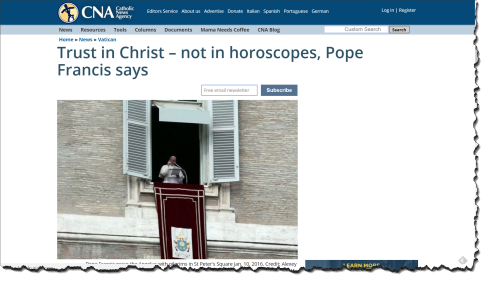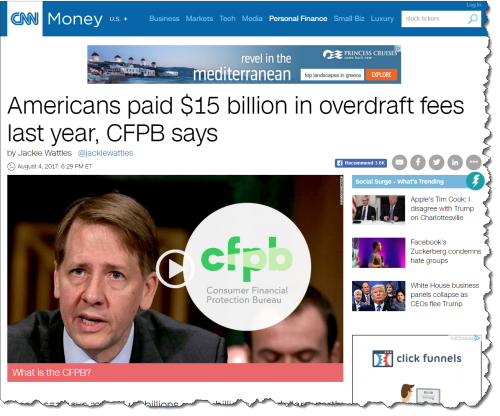James L. Paris's Blog, page 67
August 18, 2017
So What DOES Happen If You Decide to Walk Away from Your Student Loans?
Know anyone with student loan obligations they���re struggling to pay?
If so, that���s hardly surprising. There���s a bunch of people ��� young and old ��� who are on the hook for tens of thousands���if not hundreds of thousands���of dollars they borrowed to finance their college educations.
Something else that���s not a surprise is that plenty of those folks, in their frustration, are wondering if they shouldn���t just walk away from those bills. After all, what���s the worst that could happen?
Well, here���s some insight, courtesy of CNBC, into just what can happen if someone chooses to renege on their student loan obligations.
Federal Student Loans
While federal student loans offer the best terms to consumers, including lowest rates and greatest flexibility, this is the federal government you���re in business with, which means if you decide to stop making payments, bad things can happen.
If you do miss a payment, you have 270 days to make another and get back on track. If you don���t make another payment within that time frame, the debt will go into default. From there, your wages might be garnished. If the feds try to get to your assets through a private collection agency, which they���re known to use now with considerable frequency, you could be hit with penalties and fees that represent nearly 20 percent of the value of the outstanding loan balance. You might even be sued by the government. According to the Department of Justice, the government sued over 3,300 borrowers during the last two years. CNBC notes that the frequency with which the government sues student loan borrowers in default is expected to go up under the watch of Education Secretary Betsy DeVos.
Private Student Loans
Private lenders are not afforded the same flexibility as the federal government, so if you default on a private student loan, their sole remedy is to sue you. And they sue a lot.
That said, it���s worth noting that National Collegiate, ���the largest holder of private student loan debt in the nation,��� according to CNBC, has seen its batting average suffer recently when it comings to suing borrowers. It seems the company has, in some cases, sued borrowers without having the paperwork required to establish a claim to the borrowed money. As a result, National Collegiate has lost a bunch of their cases here recently.
Still, rather than banking on the notion your paperwork will have been lost by National Collegiate or any other private student loan creditor, better to avoid getting involved with them at all. Smart students are availing themselves of less conventional methods by which to keep college costs manageable, like knocking out as many credits as possible at the local community college, going to school online, or going part-time while working full-time. The fact is, there are a lot of choices now available to people seeking a four-year degree that are far less financially disruptive than borrowing up to one���s eyeballs. Why not pick one of those?
By Robert G. Yetman, Jr.
August 17, 2017
Pope Francis: Put Your Faith in Jesus, Not Horoscopes or Fortune Tellers
As reported by the Catholic News Agency, Pope Francis used his most recent weekly Angelus message delivered in Saint Peter���s Square to warn the faithful against seeking spiritual guidance from anyone other than Jesus.
While the pope has seen fit to be more embracing of many of the progressive trends sweeping the world, presently, clearly an abandonment of the Word is not one of them.
So that���s something.
In his address, the pope took issue with those who ���consult horoscopes and fortune tellers,��� among other sources of false guidance.
The pope exemplified his message by referring to the story of how Peter attempted to walk on the water of the Sea of Galilee after seeing Jesus do the same. When Peter began to sink, after being commanded by Jesus to walk toward Him, he became frightened and cried out, ���Lord, save me,��� at which point Jesus grabbed Peter by the hand and asked, ���O you of little faith, why did you doubt?���
The pope suggested the same sort of troubles can beset Christians today.
���When we do not cling to the Word of the Lord, but consult horoscopes and fortune tellers, we begin to sink,��� the pope said.
The Gospel reading, said Pope Francis, illustrates ���that faith in the Lord and in his word does not open a path where everything is calm and easy; it does not take us away from the storms of life.���
Instead, said the pontiff, ���faith gives us the security of a presence that pushes us to overcome the existential storms, the certainty of a hand that grabs us in order to help us in difficulties, showing the way even when it's dark.���
���Faith, then, is not an escape from life's problems, but it supports on the journey and gives it meaning.���
Pope Francis finished his address by asking the Virgin Mary to assist followers in staying ���firm in the faith in order to resist the storms of life, to stay on the boat of the Church, eschewing the temptation to go on amusing, yet insecure boats of ideologies, fashions and slogans.���
By Robert G. Yetman, Jr. Editor At Large
Americans Paid $15 Billion in Overdraft Fees Last Year; Were You One of Them?
Banks are making a lot of money each year from overdraft fees.
A lot of money.
CNN Money is reporting on numbers recently released by the Consumer Financial Protection Bureau (CFPB) that show American consumers paid a whopping $15 billion in fees related to bounced checks and account overdrafts last year.
Addressing the numbers in a press call last week, CFPB Director Richard Cordray said, ���Consumers living on the edge can find themselves racking up numerous overdraft charges. Despite recent regulatory and industry changes, consumers with low account balances and little margin for error continue to pay significant overdraft fees.���
Revealingly, while bank customers overdraw their accounts by an average of just $24, banks typically charge about $34 each time they do it.
Some point the finger at a confusing process associated with allowing consumers to opt-in to overdraft coverage. Many customers, they claim, have opted into overdraft coverage when they would likely be better off simply having a charge declined and then making other arrangements.
So what can you do to opt-out of these charges?
For starters, you can drop your overdraft protection. If you dump it, your one-time, in-person debit card transactions will be declined if there���s not enough money in your bank account to cover them. Be careful, though: Even if you opt out, banks can still cover ��� and charge you for having covered ��� checks, recurring debits, and online payments.
If you would prefer to split the difference between having, and entirely not having, overdraft protection, a good option is to link another account you have at your bank to your checking account. This way, should you happen to overdraw, money from the other account is transferred automatically to cover the debit balance. While there is still a fee incurred by doing this, it���s about a third the cost of a regular overdraft charge.
By Robert G. Yetman, Jr. Editor At Large
August 16, 2017
If You Got This Robocall, Pick Up Your Check For $300 to $900
As much as I hate robocalls, I was excited to learn that I will be getting a check for between $600 and $1,800 due to a class action lawsuit involving several of the major cruise lines. The amount will be based on how many phone calls you received (but the minimum is $300 even for just one call). You can collect for more than one phone number, and in my case two of my numbers came up. That means that I will be receiving a minimum of $600, but it could be as much as $1,800.

The claims process is easy and you can fill out the online form to get your money. Here is the link to check on whether or not your phone number is on the list - Click Here
Helping you make the most of God���s money!
James L. Paris
Editor-In-Chief ChristianMoney.com
Follow Me on Twitter Twitter.com/jameslparis
Christian Financial Advice
Jim Paris 24 Hour Radio
Hillary Clinton���s Pastor: Your Election Loss Was Like Good Friday
So, it seems that Hillary Clinton���s pastor has an interesting take on her election loss to Donald Trump.
Have you heard about this?
CNN is reporting on an email that Rev. Bill Shillady sent to the defeated candidate on the morning after the election, and it���s a doozy���particularly if you���re a Christian.
It seems that the reverend saw fit - as a way to console Clinton, apparently - to compare Election Day to Good Friday.
The day of Jesus��� crucifixion.
���It is Friday, but Sunday is coming,��� Shillady���s email begins. ���This is not the devotional I had hoped to write. This is not the devotional you wish to receive this day. While Good Friday may be the starkest representation of a Friday that we have, life is filled with a lot of Fridays.
���For the disciples and Christ's followers in the first century, Good Friday represented the day that everything fell apart. All was lost. The momentum and hope of a man claiming to be the Son of God, the Messiah who was supposed to change everything, had been executed.���
Hillary the Messiah, apparently.
���Today, you are experiencing a Friday,��� Shillady later adds. ���Your Friday is what happened in the last few weeks and last night in the tragic loss. But Sunday is coming!���
Hillary the resurrected.
This is just weird.
By Robert G. Yetman, Jr. Editor At Large
Stanford University to Offer Course this Fall on ���Abolishing Whiteness���
Ah, those rotten white people.
Important that we study them, however. That way, we���ll know not to emulate anything like them in the future.
Or something.
On that note, Stanford University, The College Fix has learned, is offering a charming anthropology course this fall ��� an upper-level course, no less ��� that discusses, according to an official course description, the ���possibilities of ��� abolishing whiteness.���
According to the description, the seminar, called ���White Identity Politics,��� looks at the subject from the vantage point of ���whiteness studies and from contemporary writings that push whiteness studies in new directions.���
There are ���whiteness studies?���
���Students will consider the perils and possibilities of different political practices, including abolishing whiteness or coming to terms with white identity,��� reads the course description.
The College Fix reports that it reached out to the instructor, John Patrick Moran, for comment, but that its inquiry was referred to the communications office at Stanford. Responding to The Fix via email, Stanford spokesman Ernest Miranda said, in part, that ������abolishing whiteness��� is a concept put forward in the 1990s by a number of white historians. Their belief was that if other white people would, like them, stop identifying politically as white, it would help end inequalities.���
Asked by The Fix for a copy of the syllabus, Miranda declined, saying that ���we do not share our course materials.���
Makes sense; why would Stanford want to share any of this?
By Robert G. Yetman, Jr. Editor At Large
August 15, 2017
Joint Chiefs Chair to North Korea: U.S. Ready to Defend Itself, Allies with ���Full Range��� of Capabilities
As reported by the Associated Press, the chairman of the Joint Chiefs of Staff, Gen. Joseph Dunford, USMC, landed in South Korea on Sunday, and made it clear that America is prepared to do whatever is necessary to protect herself and her allies.
Saying the nation is ready ���to use the full range of military capabilities to defend our allies and the U.S. homeland,��� Dunford���s comments, and visit to the region, underline the seriousness with which the Trump administration is taking the recent threats from North Korea.
Tensions with North Korea are exceedingly high, ratcheted up largely over what appears to be NK���s serious attempts at developing its nuclear weapons program to a level such that the country would be able to actually strike at targets on the U.S. mainland. Pyongyang���s most recent expressions of hostility have centered on threats made to the U.S. territory of Guam. Specifically, North Korea has threatened to fire four mid-range ballistic missiles into waters within 18 to 24 miles of Guam. Although North Korea has a history of making highly provocative statements against America and its allies, the comments from North Korea about Guam are being taken particularly seriously, in light of NK���s increased activity on behalf of its nuclear weapons program.
Gen. Dunford will also be visiting Japan and China as a part of his tour of the region. For its part, China announced on Monday, through the Commerce Ministry, that imports of iron ore, iron, lead and coal from North Korea will be banned, effective Tuesday.
The ban represents China���s role in enacting economic sanctions imposed by the United Nations on North Korea, through a resolution drafted earlier this month by the U.S. While U.S. Ambassador to the U.N. Nikki Haley lauded the resolution, she has soberly commented that ���we should not fool ourselves into thinking we have solved the problem, not even close.���
By Robert G. Yetman, Jr. Editor At Large
University of Georgia Shuts Down Prof Who Wanted to Let Students Choose Their Own Grades
The powers that be at the University of Georgia have acted swiftly to reverse a professor���s plans to let students choose their own grades in two of the classes he���s teaching this fall.
As reported by Campus Reform, Professor Richard Watson, an instructor UGA���s Terry College of Business, had earlier decided his novel approach to grading was appropriate because ���emotional reactions to stressful situations can have profound consequences for all involved.���
Watson���s policy was to be that if students find themselves ���unduly stressed by a grade for any assessable material or the overall course,��� they���ll have the option to ���email the instructor indicating what grade [they] think is appropriate, and it will be so changed.���
What���s more, Professor Watson had mandated that for each of the courses, ���Data Management��� and ���Energy Informatics,��� testing, including examinations, would all be ���open book and open notes,��� with the goal to be the assessment of ���low level mastery of the course material.���
Because nothing says career advancement like ���low level mastery��� of academic material.
Well, as it happens, none of this is going to take place, anyway, because once word of the professor���s planned unconventional class management techniques got out, UGA administration made sure they wouldn���t actually make it to the classroom.
Releasing a statement in his capacity as Dean of the Terry College of Business, Benjamin Ayers condemned the proposed policy, calling it ���inappropriate.���
���The syllabus stated that his grading policy would allow students inappropriate input into the assignment of their own grades. I want you to know that the syllabus did not conform with the university���s rigorous expectations and policy regarding academic standards for grading,��� said Dean Ayers.
���Rest assured that this ill-advised proposal will not be implemented in any Terry classroom,��� he concluded. ���The University of Georgia upholds strict guidelines and academic policies to promote a culture of academic rigor, integrity, and honesty.���
By Robert G. Yetman, Jr. Editor At Large
August 14, 2017
Obamacare Repeal Update And How To Invest In Bitcoin And Cryptocurrency
On the first half of this episode, Dr. Elaina George discusses the current status of Obamacare and the collapsing healthcare exchanges. Also, what people can do now to move out of traditional healthcare before it collapses (including the option of medical sharing plans). In the second half, Jim discusses how to get started investing in Bitcoin, Ethereum, Litecoin, Ripple XRP, Dash, and Monero.
Billy Graham's Daughter Says Eclipse Could Signal God's Judgment On America
On the first half of this episode, Dr. Elaina George discusses the current status of Obamacare and the collapsing healthcare exchanges. Also, what people can do now to move out of traditional healthcare before it collapses (including the option of medical sharing plans). In the second half, Jim discusses how to get started investing in Bitcoin, Ethereum, Litecoin, Ripple XRP, Dash, and Monero.












